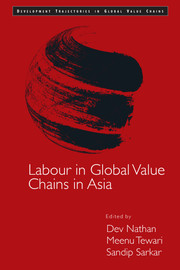Foreword
Published online by Cambridge University Press: 23 July 2017
Summary
Global Value Chains (GVCs) have emerged as an extremely important form of organization of production and value creation, thanks to technological change and the process of globalization. India is rather a late comer in this system, and even now it comparatively accounts for a smaller proportion of value creation under GVCs as compared to most of middle and high income countries.
The Institute for Human Development (IHD) has been one of the few institutions in India which pioneered in creating interest in this increasingly important issue. IHD with support from ILO and Indian Council of Social Science Research (ICSSR) had organized an international conference way back in 1998 on this subject in Bangalore, selected papers of which were brought out as an edited volume. The present volume, largely an outcome of the Capturing the Gains (CtG) research programme, supported by DFID and implemented by the University of Manchester, has been coordinated by the IHD where many of the Asian case studies included in this book were conducted.
The papers in this volume bring together studies of labour and working conditions in many GVCs across Asia. Participation in GVCs has provided many benefits to Asia—increased employment in increasing return activities, such as manufacturing and services; reduction in poverty; and the enhanced participation of women in these modern sectors. This book, however, also points to the continued weaknesses and negativities in these developments such as the continuation of sweatshop conditions, even child labour, in many parts of GVC manufacture; the appearance of new forms of Taylorism in Call Centres; and so on.
There are other books and papers too dealing with issues of workers in global production networks. This book is different in its approach, it has tried to identify the positive factors that can work to improve the conditions of labour. It emphasizes the role of workers’ organizations in the new areas of worker concentration. It stresses women's entry into the modern sectors of the economy as a factor that enables them to challenge and change existing restrictive gender norms. With an increasing sphere of GVCs creating new forms of institutions, including labour market institutions is very important. This book fills an important gap on the subject, although more such analyses will be needed in future, which it will facilitate.
- Type
- Chapter
- Information
- Labour in Global Value Chains in Asia , pp. xiiiPublisher: Cambridge University PressPrint publication year: 2016

